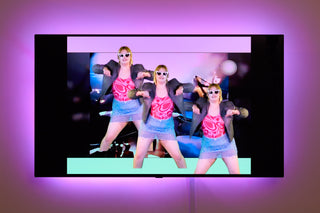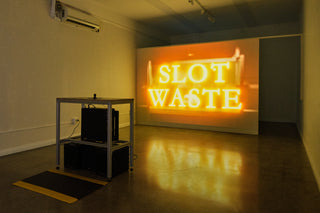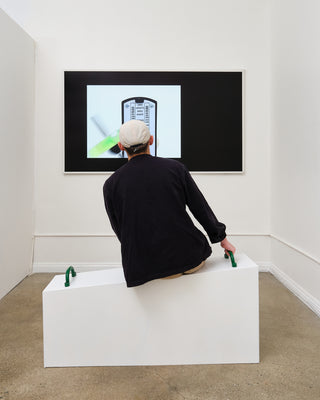-
The Alluvials is a video work and playable video game that explores the politics of drought and water scarcity in a near-future version of Los Angeles. Leveraging ecological theory, speculative fiction, and queer game theory, the narrative is told through a variety of nonhuman and elemental perspectives, including the Los Angeles River, wildfire, a 400-year-old sycamore called El Aliso, and the ghost of the city’s celebrity mountain lion, P-22.
The Alluvials film (2023) is a work of nonlinear, non-narrative storytelling. Spread across seven chapters and as many worlds, the film oscillates forwards and backwards in time, exploring multiple possible futures and revisited pasts for the region known today as Los Angeles. The film leverages game engine worldbuilding, custom stable diffusion models trained on historical and future images of the LA River, cinematic “modding” of the Grand Theft Auto V engine, and drone mapping to generate a kaleidoscopic imaginary to storytell Los Angeles.
The Alluvials video game (2024) spans four levels set in four different environments. Players take on the agency of conventionally non-playable and nonhuman characters, including wildfire, the LA River, a Yucca Moth and Joshua Tree, and a pack of wolves. The Alluvials is also a game about gaming; each level takes on a different gaming genre (first-person shooter, walking simulator, open world, racing game) and reimagines it through a speculative ecological lens.
The game aims to expand on Bucknell’s ongoing research into game ecologies: or how “nature”, ecology, and the environment are portrayed by and interacted with inside game worlds. Acknowledging Indigenous relationships to water, particularly the Tongva People of the Greater Los Angeles Basin and their understanding of the LA River as an ever-morphing entity, the project reinscribes the idea that nature is an intelligent system, a technology in its own right. Through the interactive capacities of game interfaces, The Alluvials asks its audience to consider their role in the future of water systems in Los Angeles by looking into the region’s deep past.
—
The Alluvials was commissioned by mudac in Lausanne with support from transmediale, Arts Council England, and the Los Angeles Public Library.
The game was developed with the Berlin-based game developer, Neox Entertainment.
The project was scored by the electronic musician Ken Yama.
Tom Joyes designed the Alluvials logo. Exhibition photograph by Chris Hanke.
The Alluvials is a video work and playable video game that explores the politics of drought and water scarcity in a near-future version of Los Angeles. Leveraging ecological theory, speculative fiction, and queer game theory, the narrative is told through a variety of nonhuman and elemental perspectives, including the Los Angeles River, wildfire, a 400-year-old sycamore called El Aliso, and the ghost of the city’s celebrity mountain lion, P-22.
The Alluvials film (2023) is a work of nonlinear, non-narrative storytelling. Spread across seven chapters and as many worlds, the film oscillates forwards and backwards in time, exploring multiple possible futures and revisited pasts for the region known today as Los Angeles. The film leverages game engine worldbuilding, custom stable diffusion models trained on historical and future images of the LA River, cinematic “modding” of the Grand Theft Auto V engine, and drone mapping to generate a kaleidoscopic imaginary to storytell Los Angeles.
The Alluvials video game (2024) spans four levels set in four different environments. Players take on the agency of conventionally non-playable and nonhuman characters, including wildfire, the LA River, a Yucca Moth and Joshua Tree, and a pack of wolves. The Alluvials is also a game about gaming; each level takes on a different gaming genre (first-person shooter, walking simulator, open world, racing game) and reimagines it through a speculative ecological lens.
The game aims to expand on Bucknell’s ongoing research into game ecologies: or how “nature”, ecology, and the environment are portrayed by and interacted with inside game worlds. Acknowledging Indigenous relationships to water, particularly the Tongva People of the Greater Los Angeles Basin and their understanding of the LA River as an ever-morphing entity, the project reinscribes the idea that nature is an intelligent system, a technology in its own right. Through the interactive capacities of game interfaces, The Alluvials asks its audience to consider their role in the future of water systems in Los Angeles by looking into the region’s deep past.
—
The Alluvials was commissioned by mudac in Lausanne with support from transmediale, Arts Council England, and the Los Angeles Public Library.
The game was developed with the Berlin-based game developer, Neox Entertainment.
The project was scored by the electronic musician Ken Yama.
Tom Joyes designed the Alluvials logo. Exhibition photograph by Chris Hanke.


![Alice Bucknell | The Alluvials [April 4th - May 4th, 2024]](http://gameplayarts.org/cdn/shop/files/Killscreen_Alice_Bucknell_The_Alluvials_027_Credit_ChrisHanke.jpg?v=1713047259&width=320)
![Alice Bucknell | The Alluvials [April 4th - May 4th, 2024]](http://gameplayarts.org/cdn/shop/files/Killscreen_Alice_Bucknell_The_Alluvials_001_Credit_ChrisHanke.jpg?v=1713047259&width=320)
![Alice Bucknell | The Alluvials [April 4th - May 4th, 2024]](http://gameplayarts.org/cdn/shop/files/Killscreen_Alice_Bucknell_The_Alluvials_036_Credit_ChrisHanke.jpg?v=1713047259&width=320)
![Alice Bucknell | The Alluvials [April 4th - May 4th, 2024]](http://gameplayarts.org/cdn/shop/files/Killscreen_Alice_Bucknell_The_Alluvials_015_Credit_ChrisHanke.jpg?v=1713047259&width=320)
![Alice Bucknell | The Alluvials [April 4th - May 4th, 2024]](http://gameplayarts.org/cdn/shop/files/Killscreen_Alice_Bucknell_The_Alluvials_029_Credit_ChrisHanke.jpg?v=1713047259&width=320)
![Alice Bucknell | The Alluvials [April 4th - May 4th, 2024]](http://gameplayarts.org/cdn/shop/files/Killscreen_Alice_Bucknell_The_Alluvials_037_Credit_ChrisHanke.jpg?v=1713047259&width=320)
![Alice Bucknell | The Alluvials [April 4th - May 4th, 2024]](http://gameplayarts.org/cdn/shop/files/Killscreen_Alice_Bucknell_The_Alluvials_017_Credit_ChrisHanke.jpg?v=1713047259&width=320)
![Alice Bucknell | The Alluvials [April 4th - May 4th, 2024]](http://gameplayarts.org/cdn/shop/files/AliceBucknell-TheAlluvials-FilmStills4.png?v=1713047259&width=320)
![Alice Bucknell | The Alluvials [April 4th - May 4th, 2024]](http://gameplayarts.org/cdn/shop/files/AliceBucknell-TheAlluvials-GameStills3.png?v=1713047259&width=320)
![Alice Bucknell | The Alluvials [April 4th - May 4th, 2024]](http://gameplayarts.org/cdn/shop/files/AliceBucknell-TheAlluvials-GameStills9.png?v=1713047259&width=320)
![Alice Bucknell | The Alluvials [April 4th - May 4th, 2024]](http://gameplayarts.org/cdn/shop/files/AliceBucknell-TheAlluvials-FilmStills8.png?v=1713047259&width=320)
![Alice Bucknell | The Alluvials [April 4th - May 4th, 2024]](http://gameplayarts.org/cdn/shop/files/AliceBucknell-TheAlluvials-FilmStills28.png?v=1713047259&width=320)
![Alice Bucknell | The Alluvials [April 4th - May 4th, 2024]](http://gameplayarts.org/cdn/shop/files/Killscreen_Alice_Bucknell_The_Alluvials_031_Credit_ChrisHanke.jpg?v=1713047253&width=320)



